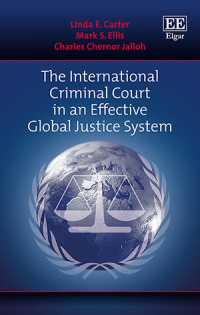平装
The International Criminal Court in an Effective Global Justice System
International tribunals need to interface effectively with national jurisdictions, which includes coordination with domestic judicial prosecutions as well as an appreciation for other non-judicial types of transitional justice. In this book, the authors analyze the earlier international tribunals established since the 1990s and the parallel national proceedings for each. In examining the ways in which the ICC can best coordinate with national processes this book considers the ICC’s present interactions with national jurisdictions and the statutory framework of the Rome Statute for interface with national jurisdictions.
More Information
Contents
More Information
This book analyzes the interactions of international criminal tribunals established since the 1990s with international, national and regional bodies, making recommendations for the International Criminal Court (ICC) as it goes forward. Placing the core issues within the statutory framework of the Rome Statute and major policy considerations, the authors examine ways in which the ICC can best coordinate with other accountability mechanisms on national and regional prosecutions, the UN Security Council, cooperation on the enforcement of arrest warrants, national non-judicial processes and amicus briefs from non-governmental organizations (NGOs).
This timely evaluation of the experiences of ad hoc international criminal tribunals spotlights the legal, political and coordination issues that will likely impact the ICC’s current mandate to adjudicate core international crimes. It explores how governments, inter-governmental bodies and global civil society might best collaborate to strengthen national capacity to investigate and prosecute atrocity crimes in pursuit of global justice. The book also considers the challenge of state cooperation with international criminal tribunals, identifying lessons for the ICC, while emphasizing the need for positive complementarity between the emerging African Criminal Court and the ICC.
Lawyers, judges, NGOs, government officials, academics and policymakers at all levels will value this book as an important resource on transitional justice and the place of justice in the aftermath of conflict and mass atrocity.
This timely evaluation of the experiences of ad hoc international criminal tribunals spotlights the legal, political and coordination issues that will likely impact the ICC’s current mandate to adjudicate core international crimes. It explores how governments, inter-governmental bodies and global civil society might best collaborate to strengthen national capacity to investigate and prosecute atrocity crimes in pursuit of global justice. The book also considers the challenge of state cooperation with international criminal tribunals, identifying lessons for the ICC, while emphasizing the need for positive complementarity between the emerging African Criminal Court and the ICC.
Lawyers, judges, NGOs, government officials, academics and policymakers at all levels will value this book as an important resource on transitional justice and the place of justice in the aftermath of conflict and mass atrocity.
Contents
内容:1。国际刑事司法复杂关系的简介2.国际刑事法院与国家司法程序之间的重要关系3.与国家系统合作4.国际刑事法院与国家非司法程序的关系5. 5.区域法院在起诉暴行犯罪中6.非政府组织通过法庭之友摘要在法院诉讼中干预结论指数





